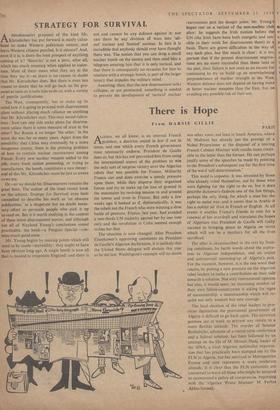STRATEGY FOR SURVIVAL
ADISARMAMENT proposal of the kind Mr. Khrushchev has put forward is nicely calcu- lated to make Western politicians uneasy, and leave Western citizens puzzled. Is it sincere? And,
even if it is, is there the least prospect of anything coming of it? 'Sincerity' is not a term, after all, which has much meaning when applied to states- men. Most of them mean what they say at the time they say it—as there is no reason to doubt that Mr. Khrushchev does. But there is even less reason to doubt that he will go back on his pro- posal as soon as it suits him to do so, with a variety of puerile justifications.
The West, consequently, has to make up its mind how it is going to proceed with disarmament plans without placing much reliance on anything that Mr. Khrushchev says. This may sound ridicu- lous: how can one side make plans for disarma- ment unless there is some measure of trust in the other'? But Russia is no longer 'the other,' in the sense she was for so many years. Apart from the possibility that China may eventually be a more dangerous enemy, there is the pressing problem of how to restrain nuclear rearmament among friends. Every new nuclear weapon added to the pile, every fresh nation possessing, or trying to manufacture, the bomb, constitutes a new threat : and of this Mr. Khrushchev must be just as aware as we are.
Or—as we should be. Disarmament remains the great bore. The author of the most recent book on the subject, Strategy for Survival, even feels compelled to describe his work as 'an obscene publication,' in a desperate but no doubt neces- sary effort to persuade people who pick it up to read on. But it is worth studying in the context of these latest disarmament moves; and although not all of Wayland Young's conclusions sound practicable, the book—a Penguin Special—con- tains much good sense.
Mr. Young begins by making points which still need to be made—incredibly : they ought to have been obvious long ago. A single bomb is now all that is needed. to evaporate England; and there is
not and cannot be any defence against it; nor can there be any division of wars into 'all- our nuclear and 'limited' nuclear. In fact it is incredible that anybody should ever have thought there was. The notion that you can drop a small nuclear bomb on the enemy and then send him a telegram assuring him that it is only tactical, and that there is consequently no occasion for him to retaliate with a strategic bomb, is part of the larger lunacy that impedes the military mind.
Assuming, then, that the new disarmament talks collapse, or are protracted, something is needed to prevent the development of 'tactical' nuclear
rearmament past the danger point. Mr. Young's hopes rest on a variant of the non-nuclear club I plan: he suggests the Irish motion before the UN (the Irish have been both energetic and sen- sible in their work for disarmament there) as a basis. There are grave difficulties in the way of any such plan, but this much is clear : it is im- portant that if the present disarmament negotia- tions arc no more successful than those held in the past. their failure is not used as an excuse for continuing to try to build up an overwhelming preponderance of nuclear strength in the West. Western defence does not depend on having more or better nuclear weapons than the East, but on avoiding any possible risk of their use.


































 Previous page
Previous page